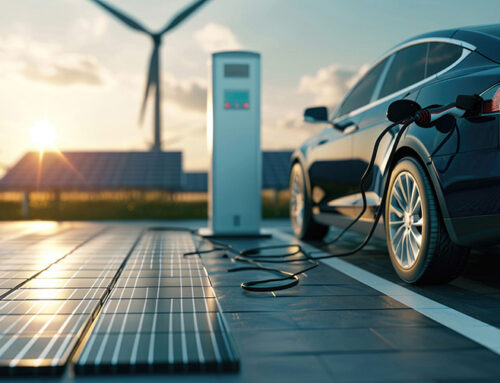CHICAGO – ComEd, the Caucus, and municipal leaders gathered on Aug. 9 to find out about ComEd’s $231 million investment in Beneficial Electrification plan programs that are designed to accelerate the adoption of electrified technologies, including electric vehicles (EVs), and to kick off the second cohort of the EV Readiness Program.
The first-of-its-kind EV Readiness Program is a collaboration between the Caucus and ComEd. The program helps local governments prepare to meet the growing demand for EVs and EV charging infrastructure. ComEd’s renewed support allows a second cohort of 15 communities to participate:

Members of the EV Readiness Program second cohort, the Metropolitan Mayors Caucus, and ComEd pose for a picture at the Caucus/ComEd second cohort kickoff on Aug. 9, 2023. | Photo courtesy of ComEd
- Batavia
- Bensenville
- Berwyn
- DuPage County
- Elgin
- Evanston
- Hickory Hills
- Highland Park
- Montgomery
- Northbrook
- Park Forest
- Peotone
- River Forest
- Wilmette
- Woodstock
“ComEd’s investments in electrification have been essential as community leaders move to reach new climate goals, navigate funding opportunities, and adopt local policies that will make EV integration safe and equitable for the residents and businesses they serve,” said City of Geneva Mayor Kevin Burns, Metropolitan Mayors Caucus Environment Committee and Energy Subcommittee Chairman. “We are thrilled to welcome a second cohort of communities committed to achieving EV readiness through this program and thank ComEd for its continued partnership in helping communities meet new demand for EV access, and the environmental benefits that come with it.”
The EV Readiness Program kicked off last year. The Caucus has been working with a diverse cohort of 16 communities to support safe and effective plans for regional transportation electrification. In addition to developing local plans and policies, participation in the program has also helped position communities for competitive funding opportunities designed to support electrification.
At the event on Wednesday, Aug. 9, attendees heard more details about the EV Readiness Program from members of the first cohort, including why they initially applied to the program, what the challenges have been, and what they have accomplished. Panelists included Mary Nicol, City of Chicago Director of Policy, Department of Transportation; Brad Maggi, Village of Skokie Operations Manager in the Public Works Department; Elizabeth Scott, Village of University Park Village Manager; and Sydney Bartelt, City of Polo City Clerk.
Press Conference
Another portion of the event, which took place at ComEd’s Chicago North headquarters, was a press conference on ComEd’s Beneficial Electrification Plan and the announcement about the utility’s new EV Charging Delivery Rate option. City of Geneva Mayor Kevin Burns, Caucus Executive Board 2nd Vice Chair, Environment Committee and Energy Subcommittee Chairman, spoke about the Caucus’ partnership with ComEd on the EV Readiness Program. A brief video with highlights from the press conference is available on the Caucus’ YouTube page.
Mayors from some of the first cohort communities were present at the press conference, including Village of Maywood Mayor Nathaniel George Booker and City of Aurora Mayor Richard Irvin. In addition to Geneva, Maywood, and Aurora, the other 13 communities in the first cohort of the EV Readiness Program are Carol Stream, Chicago, Darien, Deer Park, Glencoe, Hampshire, Hanover Park, Kane County, Oak Park, Polo, Richton Park, Skokie and University Park.
Daily Herald reporter Jenny Whidden attended and wrote an article about the Caucus’ EV Readiness Program and ComEd’s announcement about the new EV Charging Delivery Rate option.

City of Geneva Mayor Kevin Burns, Environment Committee and Energy Subcommittee Chairman speaks at the ComEd press conference on the utility’s investment in new programs to expand electrification. Other Mayors in the EV Readiness Program first cohort who were present at the press conference included Village of Maywood Mayor Nathaniel George Booker (second, from left) and City of Aurora Mayor Richard Irvin (fifth). Caucus Executive Director Neil James also attended (third from right).
New Commercial Rate Option
As part of ComEd’s three-year, $231 million investment in new customer programs geared toward removing barriers to electrification, the utility announced a new EV Charging Delivery Rate option. The option will incentivize the buildout of an expanded network of EV charging infrastructure to meet a growing need in the northern Illinois region.
This new rate option is available to all nonresidential customers with EV charging and provides them with a cost-effective alternative to demand-based delivery rates. This will help business customers that are expected to have low charger utilization in the near term as the electrification efforts continue to grow in northern Illinois. All nonresidential customers are eligible, including public sector, businesses, mass transit agencies, and other commercial categories.
Together, ComEd’s investments and partnerships to enable the electrification of transportation, buildings and industry will play a key role in addressing the impacts of climate change and enhancing air quality for all communities and advancing the goals of the state’s Climate and Equitable Jobs Act (CEJA), which sets a goal of putting 1 million EVs on Illinois roads by 2030.
“ComEd is committed to helping more residential and business customers transition to zero emissions technologies needed to build a cleaner, more resilient future for all,” said ComEd CEO Gil C. Quiniones. “Working in collaboration with state, municipal and regional partners, ComEd is offering new programs to help remove barriers to going electric at home, on the road and at work – with a special focus on underserved communities that have been hit hardest by carbon emissions.”
EVs are on the rise in Illinois, with nearly 70,000 registered with the state today, and more being registered every month. The development of adequate EV charging infrastructure is essential to supporting customers in making the transition to an EV and reducing range anxiety. Thousands more chargers will be needed in the years ahead to support new state goals for expanding EVs, with the National Renewable Energy Laboratory estimating between 18,000-36,000 additional fast charging stations needed statewide.
“As we move towards developing a new fueling infrastructure for the state – the utility role will only become more critical. ComEd’s new rate options will complement the state’s investment in charging infrastructure and help create an expansive public charging network in Illinois,” said Megha Lakhchaura, State of Illinois EV Officer. “We hope to see continued initiatives from ComEd that align with the state’s attempts to accelerate the transition to zero-emission vehicles and fight climate change.”
The transition to electric technologies, including EVs, offers residents a way to lower their carbon footprint while at the same time enhancing air quality across the region. ComEd’s new investments in electrification are projected to lower greenhouse gas (GHG) emissions by over 400,000 metric tons over the life of the plan, the equivalent of the amount of carbon sequestered by approximately 500,000 acres of U.S. forests in one year.
Additional customer programs to incentivize and accelerate the adoption of EVs and other electrified technologies will be rolled out in the coming months as part of ComEd’s three-year investment. These programs, which include new rebates, make-ready infrastructure support, and pilot studies, are designed to support a transition to cleaner technologies and were informed by feedback gathered last year from hundreds of participants representing communities, health advocacy, industry, local business, school districts and other customer groups across the service region.
For more details, please see this ComEd press release.





